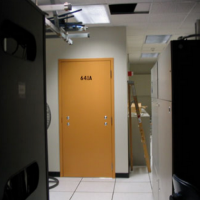Court Throws out Obama Administration’s State Secrets Defense in NSA Surveillance Case
 Secret NSA data routing room at AT&T (photo: Mark Klein)
Secret NSA data routing room at AT&T (photo: Mark Klein)
The federal government cannot use the state secrets defense to derail a lawsuit challenging the National Security Agency’s (NSA) warrantless wiretapping that occurred during the George W. Bush years, a federal judge has ruled (pdf).
U.S. District Judge Jeffrey White in San Francisco rejected the U.S. Department of Justice’s argument that the litigation would expose national security information, which is the basis for the oft-cited state secrets defense.
But White also did not give the plaintiff, the Electronic Frontier Foundation, permission to continue its case.
Citing the domestic surveillance law known as the Foreign Intelligence Surveillance Act (FISA), the judge said the statute prevents the government from being sued for illegally spying on Americans. Nevertheless, an EFF attorney was pleased with the ruling.
“That is huge,” Cindy Cohn, EFF’s legal director, told Wired. “That was the centerpiece of the government’s defense.”
EFF’s lawsuit accuses the federal government of forcing the nation’s largest telecommunication companies to illegally transfer Americans’ electronic communications to the NSA during the Bush administration.
The accusation stems from documents provided in 2006 by Mark Klein, a former AT&T technician, which disclosed the existence of a secret room in an AT&T San Francisco office that routed data to the NSA. Klein explained that his job included connecting Internet circuits to a splitting cabinet that led to the secret room. In the course of his work, he learned that similar routing technology was being installed in other cities, including Los Angeles, San Diego, Seattle, and San Jose. “They are collecting everything on everybody,” he told Wired.
Following that revelation, Congress passed legislation to give telecommunication companies retroactive immunity (pdf) from lawsuits resulting from their collusion with the NSA. The Supreme Court later rejected an EFF and ACLU petition arguing that the immunity law was an “unprecedented violation of the separation of powers.”
The new states secret ruling comes a month after The Guardian leaked documents that seem to support allegations made in the EFF’s lawsuit. “This is a complete vindication,” commented Klein.
-Noel Brinkerhoff, Danny Biederman
To Learn More:
Court Rejects State Secrets Defense in Dragnet Surveillance Case (by David Kravets, Wired)
Judge Rejects State Secrets Defense in Wiretapping Lawsuit (by Dan Levine, Reuters)
NSA Leak Vindicates AT&T Whistleblower (by David Kravets, Wired)
Court Decision: Carolyn Jewel, et al., v. National Security Agency, et al; Virginia Shubert, et al., v. Barack Obama, et al. (United States District Court for the Northern District of California) (pdf)
High Court Let’s Telecoms Keep Immunity in NSA Spy Case (by Noel Brinkerhoff, AllGov)
Obama Administration Claims It Can’t Be Sued over Indiscriminate Wiretapping (by David Wallechinsky and Noel Brinkerhoff, AllGov)
Federal Court Gives Go-Ahead to NSA Illegal Surveillance Case (by Noel Brinkerhoff and David Wallechinsky, AllGov)
- Top Stories
- Unusual News
- Where is the Money Going?
- Controversies
- U.S. and the World
- Appointments and Resignations
- Latest News
- Trump Renames National Football League National Trump League
- Trump to Stop Deportations If…
- Trump Denounces World Series
- What If China Invaded the United States?
- Donald Trump Has a Mental Health Problem and It Has a Name






Comments